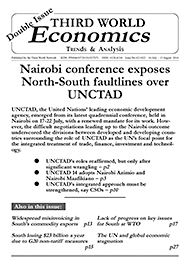Issue
No. 621/622, 16 July – 15 August 2016
Nairobi
conference exposes North-South faultlines over UNCTAD

*Click on cover to download (PDF)
UNCTAD’s
roles reaffirmed, but only after significant wrangling
The UN’s leading development organization concluded its latest conference
with the adoption of an outcome declaration, but the difficult process
in attaining agreement reflected the shaky state of North-South relations.
by Martin Khor
UNCTAD
14 adopts Nairobi Azimio and Nairobi Maafikiano
UNCTAD 14 concluded after adopting a political declaration and a negotiated
consensus outcome document which framed the agenda for UNCTAD’s work
over the next four years.
by Kanaga Raja
Nairobi
Maafikiano sets UNCTAD’s work for next four years
The
14th session of the United Nations Conference on Trade and Development
(UNCTAD 14) ended on 22 July with the adoption of two documents, one
of which is the Nairobi Maafikiano, or the Nairobi consensus document,
which sets out the work programme for the organization for the next
four years.
Some
excerpts from the Nairobi Maafikiano (advance copy dated 22 July 2016),
which is titled “From decision to action: Moving towards an inclusive
and equitable global economic environment for trade and development”,
are reproduced here.
UNCTAD’s
integrated approach must be strengthened, say CSOs
Civil society organizations meeting on the eve of UNCTAD 14 underlined
the need to strengthen UNCTAD’s integrated approach to trade, finance,
investment and technology, declaring that the UN body “provides a
critical institutional framework and a unique forum for taking up
the challenges of equitable development”.
by Kanaga Raja
Widespread
misinvoicing in South’s commodity exports
A study released at UNCTAD 14 on misinvoicing of commodity exports
suggests that this practice constitutes a major channel of capital
flight that is depriving developing countries of much-needed development
resources.
by Chakravarthi Raghavan
South
losing $23 billion a year due to G20 NTMs
Non-tariff measures, which are becoming increasingly prevalent, are
raising trade costs for developing countries and restricting their
access to export markets, according to UNCTAD.
by Kanaga Raja
Lack
of progress on key issues for South at WTO
A 25 July meeting of heads of delegation at the WTO heard reports
by the chairpersons of the various Doha Work Programme negotiating
bodies which indicated that the talks had made scant headway on key
issues of interest to developing countries.
by Kanaga Raja
US,
EU and Australia want “hefty payment” for PSH and SSM
Member states of the WTO remain sharply divided over moves to better
enable developing countries to hold public food stocks and to protect
their farm sectors from drastic market fluctuations.
by D. Ravi Kanth
Brazil
derided at G20 meet on domestic support proposal
A proposal co-sponsored by Brazil, a leading member of the developing-country
G20 grouping in the WTO, on dealing with trade-distorting farm subsidies
has failed to gain traction among some of its fellow G20 members.
by D. Ravi Kanth
Concerted
move by EU, US and allies to rewrite e-commerce work programme
A number of proposals have been presented seeking to push forward
the WTO’s work on electronic commerce, but several developing countries
are urging caution over any expansion of activities in this area.
by D. Ravi Kanth
Brazil
rebuffed on effort to wind up CTS subordinate bodies
Brazil
has been unable to secure sufficient backing for a proposal to suspend
the subsidiary bodies of the WTO’s Council for Trade in Services,
reports D. Ravi Kanth..
Opinion:
The UN and global economic stagnation
Marginalization
of the UN system in global economic governance is threatening the
very future of economic multilateralism, writes Jomo Kwame Sundaram.
